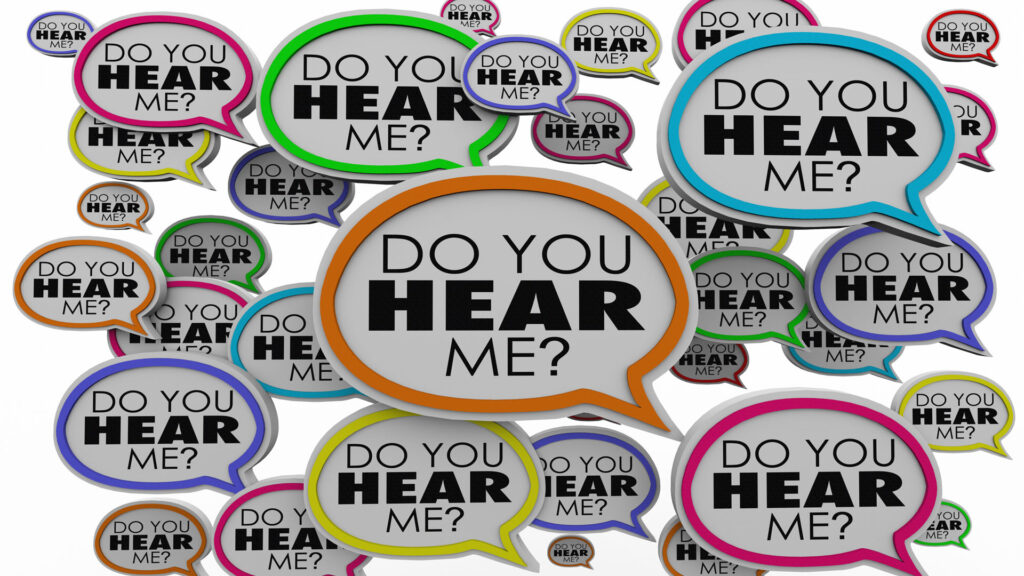Does the title of this blog capture your attention? There is no doubt that this is a tough one for me. In the essence of humility, I have often struggled with the difference between listening and hearing. People have asked me the question, “Are you a good listener?” and I would answer yes even though others close to me may disagree.
In reality, I think we are asking the wrong question. The real question is this, “Are you good at active listening?” The difference between the two will be instrumental in having a high-quality vs. a low-quality relationship.
- Listening is an ACTIVE mental process – the art of paying thoughtful attention with a mind toward understanding the complete message being delivered.
- Hearing is receiving information.
Think about our world today. We need active listeners more than ever. A lot is riding on this concept. I would be so bold to say that our future depends on knowing the difference.
Five years ago, I was given the assignment to interview an executive. The instructions were clear, interview an outstanding performer, “coach” them for an hour, and try to facilitate a positive mental framework the entire time. I was apprehensive, to say the least.
As I stepped into the office of a very busy executive who wasn’t sure what I was doing there and why she was being interviewed, I simply needed to trust the process. To trust the process, it was critical that I do more than listen and that I must dial into a deeper level of active listening. Can you imagine someone you don’t know very well walking into your office in the middle of the day to interview you for an hour? Trust me, it wasn’t the most comfortable of situations. My anxiety level was high, but fortunately my professor and mentor provided me with a set of provocative questions.
- If your life were perfect, and your dreams came true, what would your life and work be like in 10-15 years?
- What are the values and virtues that are most important to you?
- What kind of person would you love to be?
- Who helped you the most become who you are or get to where you are?
- What would you wish your legacy to be?
Those are some excellent questions. I hope that you are sitting somewhere at work, home, or vacation, and you’ve stopped reading to think about those questions in your life. The interview was a fantastic exploration of another person’s journey.
Here was the real breakthrough moment. In one hour, I knew more about this relative stranger than I did about people who had worked for me for over five years. It was a sobering realization and one that made me realize that I get so focused on myself that I don’t actively listen to someone else’s story. WOW!! There is no doubt that this exchange changed me at the core, and after the interview I sat in the parking lot for over an hour, processing what just happened. The combination of questions, focus, and sincere interest in someone else turned this from an assignment to a mission
Four plus years later, I vividly remember another professor putting up a slide with the following definitions. The slide had the descriptions of listening and hearing.
During the class, we watched a funny clip from the hit television show “Everybody Loves Raymond,” and I had a tipping point moment. I’m an “ok” listener but NOT a great active listener. After the clip, we were provided three tips about the mindset of active listening. (Another great clip is from the movie “Patch Adams,” featuring the late great Robin Williams and both clips are included below for your reference.)
- Suspend judgment – approach interactions as a chance to mine for gold not dig for dirt (that ought to make us think)
- Maintain an open mind – if you have already made up your mind, you will not hear anything new
- Be fully present – the other person deserves your full attention (this means stop multi-tasking)
Look at the three tips more carefully. To “suspend judgment” illustrates that we have to slow down and turn the attention away from ourselves. To “maintain an open mind” demonstrates the direct opposite of having a closed mind. To “be fully present” means stop multi-tasking.
In hindsight, the interview was a success because of these three principles. I challenge you to go into your next three conversations with a mindset of active listening, NOT just hearing. For most of us, this will take practice and discipline. I believe that our relationships demand it. Best of luck.





